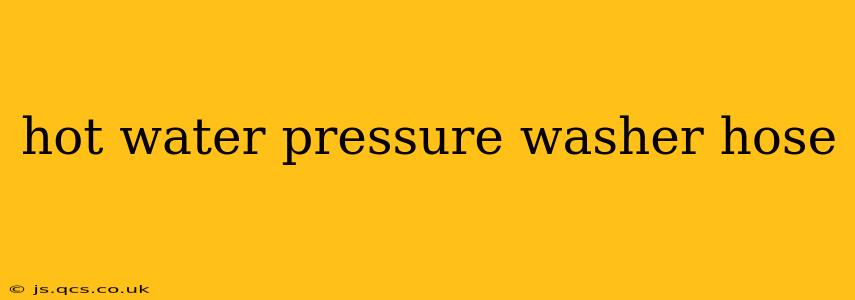Choosing the right hot water pressure washer hose is crucial for efficient and safe cleaning. A substandard hose can lead to leaks, premature failure, and even injury. This guide will explore the key factors to consider when selecting a hot water pressure washer hose, answering common questions and providing expert advice.
What are the Different Types of Hot Water Pressure Washer Hoses?
Hot water pressure washer hoses are typically constructed from reinforced rubber or specialized polymer materials designed to withstand high temperatures and pressures. The key difference lies in the materials used and the level of reinforcement. You'll commonly find hoses made from:
-
Rubber: This is a traditional material, offering good flexibility and durability. However, high-quality rubber hoses are essential for hot water applications to prevent cracking and weakening. Look for reinforced rubber hoses with multiple layers for increased strength and longevity.
-
Polymer blends: These advanced materials offer superior resistance to heat, abrasion, and chemicals. They often last longer than traditional rubber hoses, justifying their higher initial cost through extended lifespan and reduced replacement frequency.
What Length Hot Water Pressure Washer Hose Do I Need?
The ideal hose length depends on your cleaning needs and the size of your workspace. Too short a hose restricts your reach, while an excessively long one can be cumbersome and prone to kinking. Consider:
-
Reach: How far do you need to reach from the pressure washer to the cleaning area?
-
Maneuverability: A longer hose provides more flexibility but might become unwieldy. Shorter hoses are easier to manage in tight spaces.
-
Storage: How will you store the hose when not in use?
Most hot water pressure washer hoses range from 25 to 50 feet, with 50 feet being a popular choice for larger properties or commercial applications.
How Much Pressure Can a Hot Water Pressure Washer Hose Handle?
The pressure rating of your hose is crucial for safety and performance. The hose must exceed the maximum pressure output of your pressure washer. Check the specifications on both your pressure washer and the prospective hose to ensure compatibility. A mismatch can result in hose failure, potentially leading to injury or property damage. Always err on the side of caution and select a hose with a higher pressure rating than your machine's output.
How to Choose the Right Size Hot Water Pressure Washer Hose?
The hose diameter (usually expressed in inches or millimeters) impacts flow rate. Larger diameters generally allow for higher flow rates, leading to more efficient cleaning, especially when dealing with larger areas or stubborn dirt. However, larger hoses can be heavier and more cumbersome. Match the hose diameter to your pressure washer's specifications for optimal performance.
What are the Best Materials for a Hot Water Pressure Washer Hose?
Durability and heat resistance are paramount when selecting materials for hot water pressure washing hoses. Look for hoses constructed from:
-
High-temperature rubber: specifically designed to withstand the elevated temperatures of hot water pressure washers.
-
Reinforced layers: Multiple layers of reinforcement significantly increase the hose's resistance to kinking, punctures, and bursting.
-
Abrasion-resistant outer layer: this protects the hose from wear and tear during use.
How Do I Maintain My Hot Water Pressure Washer Hose?
Proper maintenance extends the life of your hot water pressure washer hose. This includes:
-
Regular inspection: Check for cracks, abrasions, or kinks before each use.
-
Proper storage: Store the hose in a cool, dry place away from direct sunlight and extreme temperatures. Avoid coiling it too tightly, which can cause stress and damage.
-
Cleaning: After each use, rinse the hose with clean water to remove any dirt or debris.
By carefully considering these factors, you can select a hot water pressure washer hose that meets your needs, ensuring efficient, safe, and long-lasting performance. Remember always to prioritize safety and check compatibility with your pressure washer before making a purchase.
